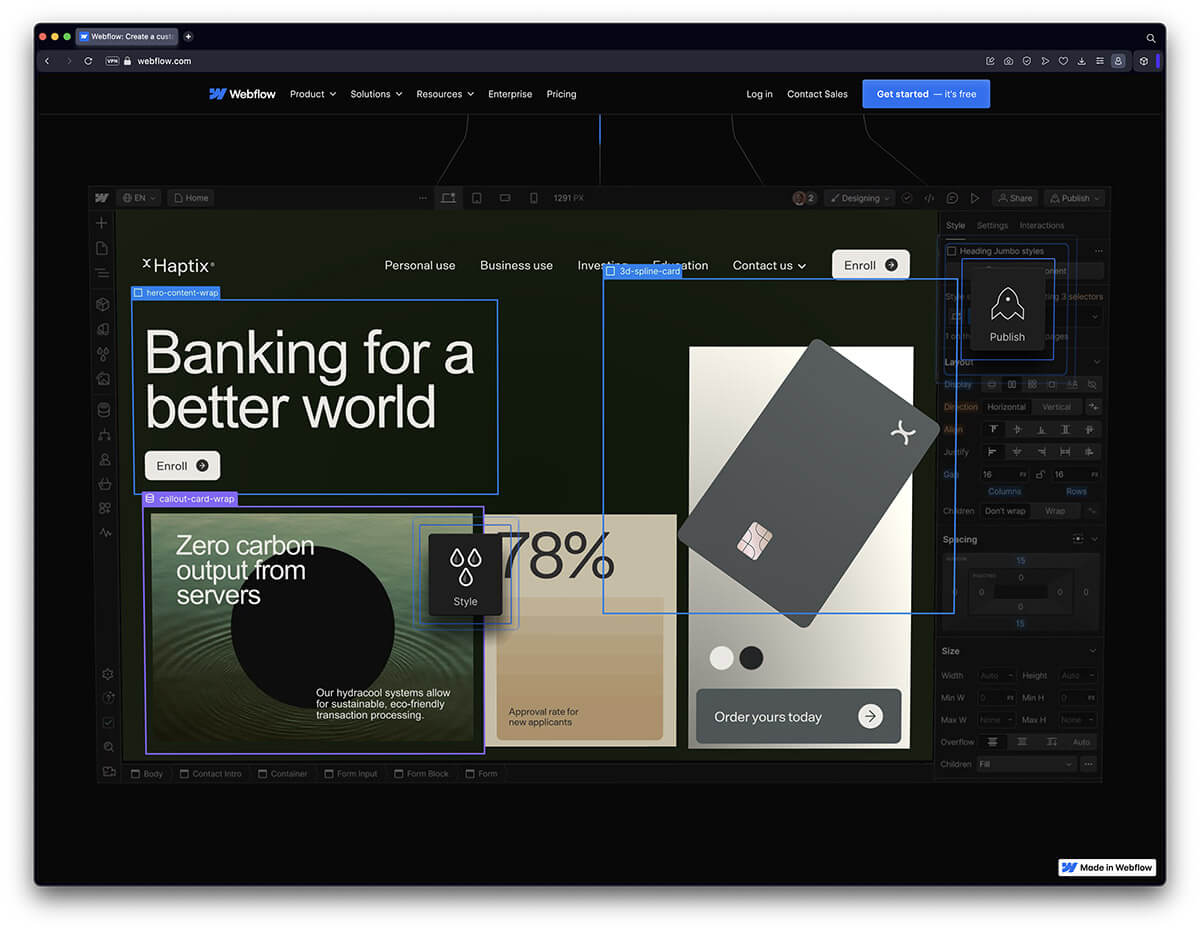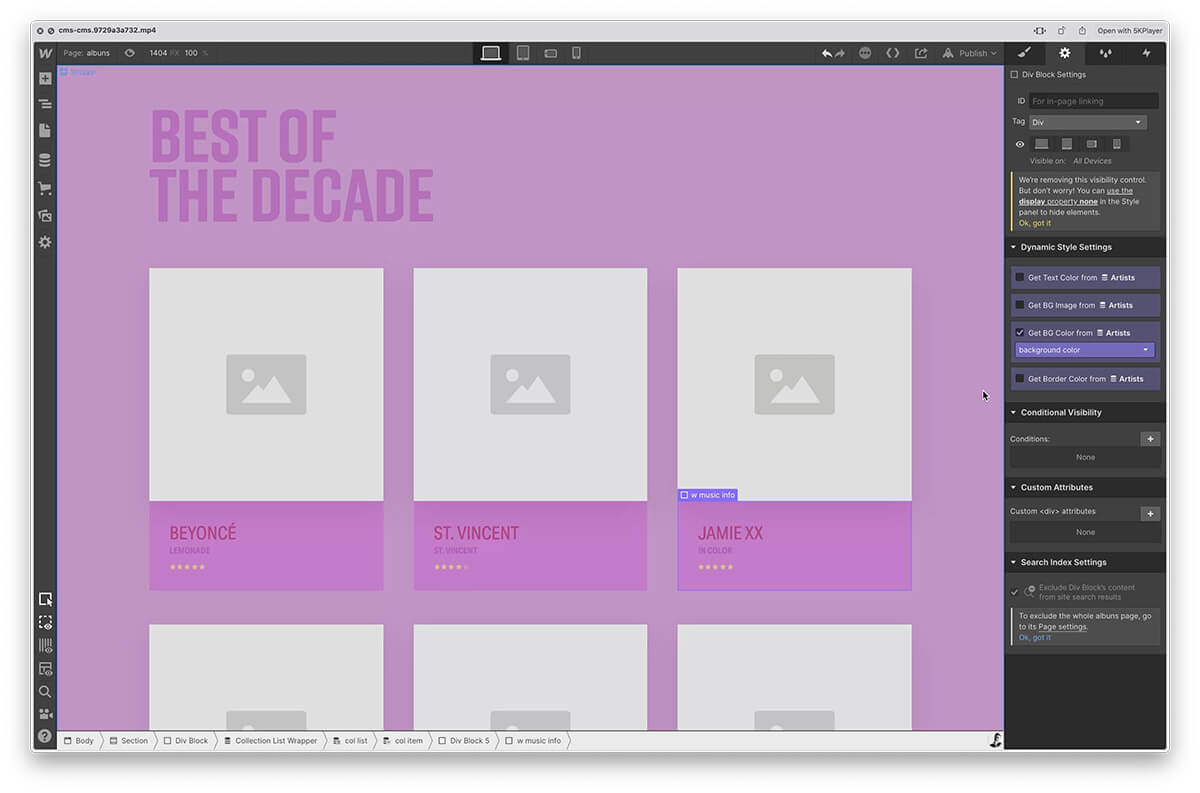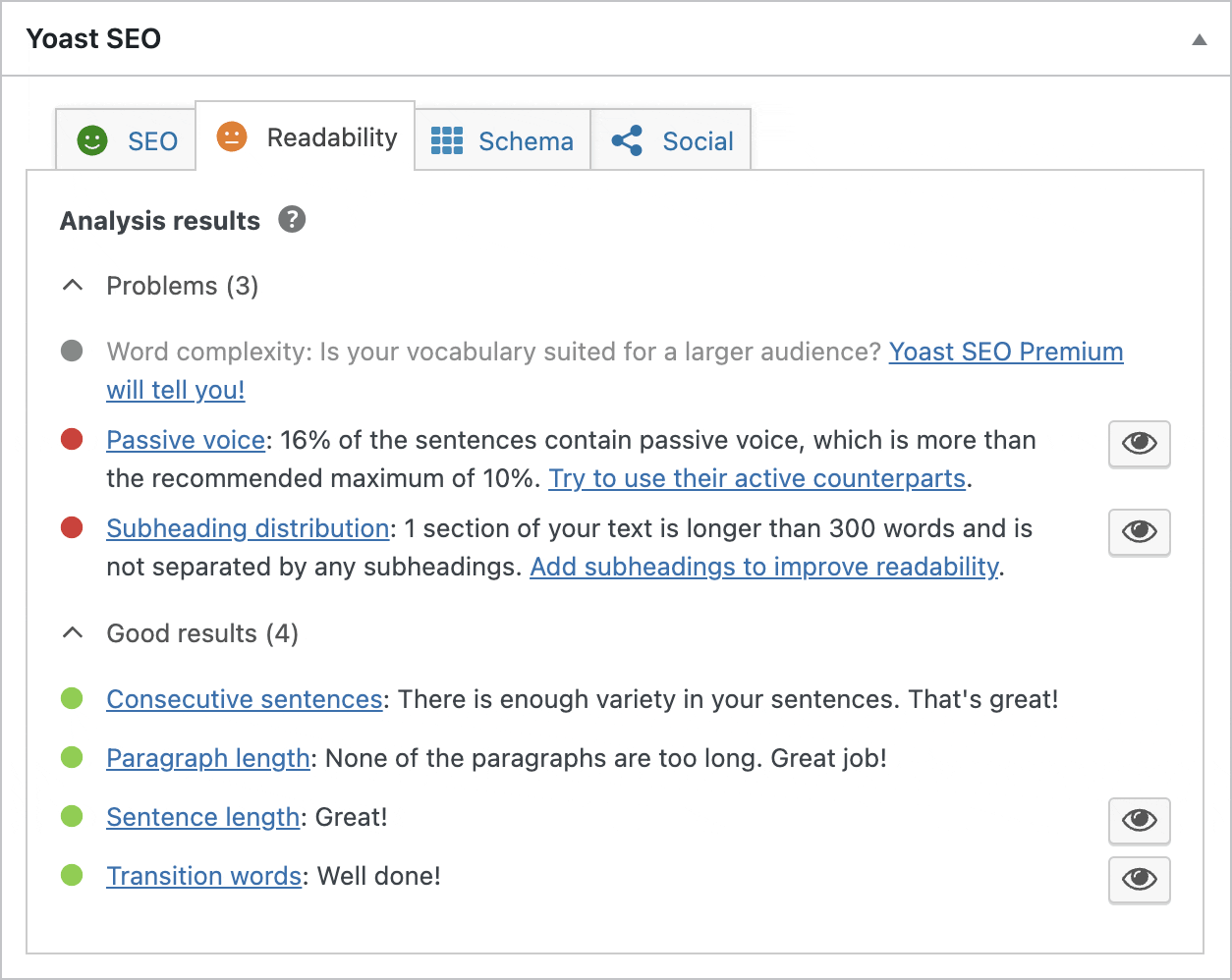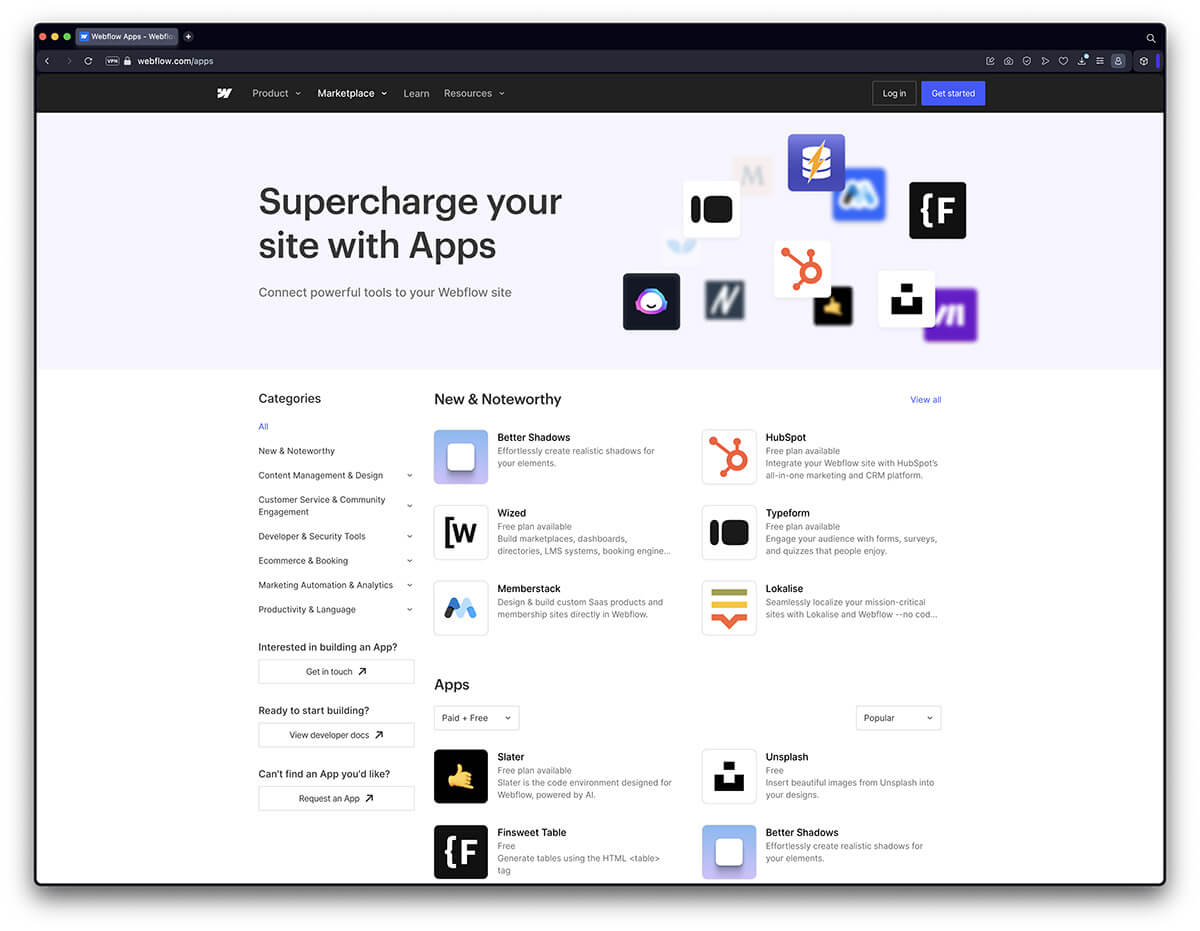
Article
WordPress vs. Webflow: Unraveling the Best Choice for Modern Web Design
PUBLISHED:October 24, 2023
UPDATED:February 23, 2024
We have worked with WordPress for around 17 years. We launched in the same year as WordPress, but the early versions focussed very much on blog posts. The open-source platform introduced new features and customisation options a few years later. We were drawn to its ease of use and complete control of the front end, especially as additional features were added.
Over the years, we have utilised WordPress for complex business websites such as Sapience Communications, Multilingual charity websites for Friends of Friendless Churches and a host of small business and start-up sites.
More recently, we’ve been developing sites in Webflow and have been impressed by its features, so we’ve put together a WordPress vs Webflow comparison guide to help you choose which platform might be the better choice for your project. So, if you are considering a WordPress or Webflow website for your online store or business, read on and hopefully, this guide will help you choose the one that’s right for your specific needs.
What is WordPress?
WordPress is a well-known website builder with a history dating back to the early 2000s. It started as a blogging platform and has evolved into one of the internet’s most popular content management systems.
A WordPress website comes in two distinct flavours: WordPress.com and WordPress.org. The main difference between the two platforms is that one is a hosted solution (.com), and the other (.org) is open-source software you will download and host yourself.
WordPress is praised for its scalability, making it suitable for single-page and large corporate websites. Its robust ecosystem and constant development ensure a WordPress site remains a top choice for many businesses.
WordPress Facts
- According to w3techs.com 43% of the world’s websites are built with the WordPress CMS (63.1% if you limit to CMS-enabled sites).
- The official WordPress site counts 60,000 free plugins. Add to this a huge array of premium plugins.
- In 2022, there were 9,000 free themes in the official WordPress directory.
- If you include premium themes, there were over 20,000 WordPress themes in 2022, according to Colorlib.
What is Webflow?
Launching in 2013, Webflow has evolved into a powerful tool, going from strength to strength. It combines a visual web design tool with built-in hosting services and an easy-to-use content management system.
Webflow is known for its ability to allow for precision design control, unique interactions & animations, and completely custom website builds. As a newcomer to the industry, it’s slowly becoming a fan favourite among web designers, agencies and clients.
WebFlow Facts
- Webflow CMS already boasts over 45,000 paying subscribers.
- Webflow’s user base is over 4 million users.
- There are already over 2000 templates for Webflow.
- Webflow University provides access, info and tutorials to support users of all levels.
Comparing Apples with Apples
There are many ways of building both platforms, but we have focussed this article on solutions for e-commerce stores and business websites with custom designs. If you are looking for more of a budget option, many off-the-shelf themes and website-building platforms like Wix and Squarespace should also be considered.
What’s the difference between Webflow and WordPress?
When choosing a web builder, user experience is at the top of the list. You want to make sure that your website not only looks good but is easy to navigate, fulfils your user’s needs and loads quickly as well.
According to Goodfirms, “88.5% of the survey contributors have selected slow loading time to be the paramount reason for a visitor to leave a website. Secondly, the lack of responsiveness of website design with multiple devices is an issue that was indicated by 73.1% of the survey takers.”
User experience is paramount to a good website and the platform your website is built on can be a deciding factor. The goal of any business is to ensure that your website is running smoothly so that you can focus on more important tasks. Knowing which platform to go with can make a big difference in the long run so let’s dive deeper.
The visual editor and easy integration with tools like Figma reduce the learning curve, making Webflow websites an excellent option for a web designer. Conversely, web developers with coding experience and greater technical knowledge might feel more at home with WordPress.
We have found, however, that having a thorough understanding of development best practices and the ability to write Javascript and custom code makes a big difference when delivering more complex Webflow solutions.
Cost and Site Plans
WordPress.org is free, but you will pay for additional costs for hosting. WordPress.com does have a very limited free account plan which is ok for personal blogs, but you’ll need to pay more if you want to use plugins or run an eCommerce store.
Webflow has a ‘starter’ free plan for its (very) basic option, but you’ll need to pay for its basic plan at $18 /month if you want to run a Webflow site for your business and use a custom domain name. You’ll also need to opt for a paid plan if you want a CMS, with prices starting at $29/month. There are also specific e-commerce plans if you wish to launch an e-commerce store. You can check out the full price list here.
Webflow carries a slightly higher price tag than WordPress; however, this changes when you consider expenses for hosting and plugins.
Most WordPress websites require plugins to improve site speed performance, website security, image optimisations, website backups and reduce spam. While these additional plugins are initially free, they will eventually incur costs over time. As your website grows, you’ll be expected to upgrade to premium and pro versions, which can quickly cost more than expected. Webflow packages all of these plugins into one nifty price.
Content Management System (CMS)
WordPress’s easy-to-use content management system is great for businesses that need a scalable backend that can grow as your business grows. Its user-friendly interface makes it easy for those unfamiliar with websites to edit, update and add new content with relative ease.
Webflow’s content management system differs from WordPress’s because it’s better integrated into their visual web builder. Their web builder empowers web designers to create custom layouts and designs around a complex CMS without limitations. This content can easily be edited and updated by those unfamiliar with Webflow or websites in general.
Webflow also makes migrating content easy. If you’ve built an ecosystem of content on WordPress, migrating to a more modern web builder such as Webflow can seem daunting. However, this process is relatively simple with the support of an experienced Webflow designer or agency. Hiring someone to take care of this can put your mind at ease and reduce risk.
Hosting and Security
Webflow offers an all-inclusive hosting solution, simplifying website management. Their hosting infrastructure is optimised for speed, ensuring fast page loading, a critical factor for user experience and SEO. Webflow also provides security with automatic updates, free SSL certificates and website backups, providing a hassle-free experience.
In contrast, WordPress’s hosting depends on your hosting provider, leading to varying performance and costs. While many security plugins are available, their effectiveness depends on correct configuration, ongoing monitoring and more active management.
If you want a hands-off, straightforward approach to managing your website hosting and security, go with Webflow. If you want flexibility to change providers and have more control, go with WordPress.
At LWDA, we use a proven secure hosting solution for all of our WordPress websites. This includes daily backups, a staging server for development requirements, and extra features such as SSL management, CDN and hidden URLs for login screens to help avoid security breaches.
SEO
Webflow sets the stage for solid SEO with its clean code and structured data. You can tweak critical on-page elements like meta tags, giving your site a better shot at getting noticed by search engines. Plus, Webflow’s dedication to responsive design ensures that your site looks great on mobile devices, an essential factor in search engine rankings.
Webflow’s optimised, built-in hosting also adds a nice cherry on top. You know your website will load fast and climb up those search engine results without question.
Now, WordPress takes a different approach. It doesn’t have any built-in SEO tools, preferring to collaborate with SEO plugins such as Yoast SEO to provide deep insights. You’ve got plenty of room to customise, and the content creation tools are super handy. With many plugins at your disposal, you can fine-tune your SEO game. And if you ever need help, WordPress boasts a bustling community ready to share knowledge.
When choosing between Webflow and WordPress, think about your website’s needs. Either platform can deliver great SEO optimization, so go with what feels right for you and your specific goals.
E-commerce
Webflow’s intuitive visual builder grants you full control over your e-commerce site’s layout and aesthetics, making it a top choice for business owners creating engaging shopping experiences. Its e-commerce features are built-in and don’t require plugins to get your store off the ground. It’s ideal for small to medium-sized businesses aiming to leave a memorable impression on their customers.
Combining Webflow with Shopify’s e-commerce functions is popular with many web designers and business owners.
WordPress, when paired with WooCommerce, provides a vast and mature ecosystem for online stores, making it highly adaptable and suitable for businesses of all sizes.
WooCommerce provides essential e-commerce features like product listings, inventory management, flexible shipping options and secure payment processing. It also has a large number of free and paid-for plugins that anyone can use.
Both perform well regarding their e-commerce capabilities; Webflow benefits due to its built-in e-commerce, but WordPress might prove the best option when a more complex solution is required.
WordPress Plugins vs Webflow Apps
Both WordPress Plugins and Webflow Apps offer an array of integrations to increase the potential of your site.
The total number of WordPress plugins available has grown over the years, with nearly 60,000 free plugins available in the WordPress plugin directory. They offer flexibility and customisation options, making them a great choice for many business owners needing to increase the functionality of their website.
However, the abundance of plugins needed can sometimes lead to management challenges, including potential conflicts and compatibility issues when upgrades are needed.
The Webflow marketplace apps function similarly allowing you to increase your website’s functionality immensely. Want to integrate a bookings system customer portal or automate your workflow? Apps such as Zapier, Memberstack, and Airtable offer no-code solutions to do this. Making it easy to build custom web apps from the ground up in Webflow.
The number of third-party Webflow apps fulfils the majority of use cases, but the selection is more limited compared to the vast WordPress plugin ecosystem. Limiting the choice benefits Webflow website owners as only approved apps are allowed onto the marketplace, making conflicts a rarity.
WordPress vs Webflow: Conclusion
Several factors stand out in comparing the widely-used open-source content management system, WordPress, and the rising platform, Webflow. From the familiar WordPress dashboard to Webflow’s advanced features, both platforms have their strengths. While WordPress is renowned for its vast range of third-party plugins and free templates, Webflow offers powerful tools that cater to custom websites, making it one of the most popular website builders today.
Design elements play a pivotal role in both platforms, with Webflow having an edge in precision. While WordPress offers a free version that’s been the foundation for many starting their journey in building websites,
Webflow’s workspace plans are tiered, catering to basic users and those seeking a more advanced e-commerce business plan.
For businesses focusing on search engine optimisation, both platforms offer robust tools to enhance search results. However, Webflow’s integrated system reduces the reliance on external plugins for SEO.
When considering web hosts, WordPress offers flexibility, but this often requires sifting through a myriad of options. Webflow simplifies this process with its integrated hosting.
The debate between the two becomes more intricate when discussing e-commerce sites. While WordPress, when paired with plugins, can craft a robust e-commerce store with greater control, Webflow’s built-in e-commerce plans streamline the process.
For businesses on a budget, the free version of WordPress may be enticing. However, when accounting for the potential costs of third-party plugins and premium page builders, Webflow might emerge as the better option with its all-inclusive account plans. Marketing teams, especially, might find Webflow’s design-centric approach an excellent choice when aligned with modern branding needs.
In the vast landscape of website-building platforms, while both WordPress and Webflow are powerful contenders, there needs to be a clear winner. The ideal choice hinges on personal preference, from the intricacies of design elements to the complexities of e-commerce store requirements. However, with both platforms continually evolving and introducing new features, businesses and individual users have the tools to create an impactful online presence.
Need a new website for your business?
If you would like to know more about your options for building a new website for your business, feel free to drop us a line. We’re always happy to discuss your requirements and recommend the best solution.
WordPress vs Webflow: FAQ
The main difference is that WordPress.com is a hosted solution, while WordPress.org is open-source software that you download and host yourself.
Webflow offers an all-inclusive hosting solution, optimised for speed, with automatic updates, free SSL certificates, and website backups. In contrast, WordPress’s hosting depends on your choice of provider, and security requires more active management with plugins.
WordPress requires the WooCommerce plugin for e-commerce capabilities, while Webflow has built-in e-commerce features.
According to w3techs.com, 43% of the world’s websites are built with WordPress.
Goodfirms states, “88.5% of the survey contributors have selected slow loading time to be the paramount reason for a visitor to leave a website.”
Webflow offers built-in SEO features with clean code and structured data. In contrast, WordPress typically requires SEO plugins such as Yoast SEO to provide deep insights and customisation options for SEO.
One downside of Webflow is its steeper learning curve, especially for those accustomed to other platforms. While it provides greater design control, it may be challenging for beginners. Additionally, while its ecosystem grows, it still needs to match the extensive range of plugins and themes available for WordPress.
The decision to switch from WordPress to Webflow depends on your specific needs. If you prioritise a visually precise, fully customisable design and are willing to learn a new platform, Webflow might be a good fit. However, sticking with WordPress might be more suitable if you rely heavily on specific WordPress plugins or prefer a platform with a vast community and resources.
Yes, Webflow has a promising future. Since its launch in 2013, it has seen steady growth and has been increasingly adopted by web designers and agencies for its powerful design tools and integrated hosting services. Its focus on visual design control and no-code development makes it a strong contender in the evolving web design market.
Yes, Webflow is used by professionals, including web designers, agencies, and businesses. Its precise design control and custom website building capabilities make it a favourite among professionals seeking to create unique and modern websites without relying heavily on coding.






